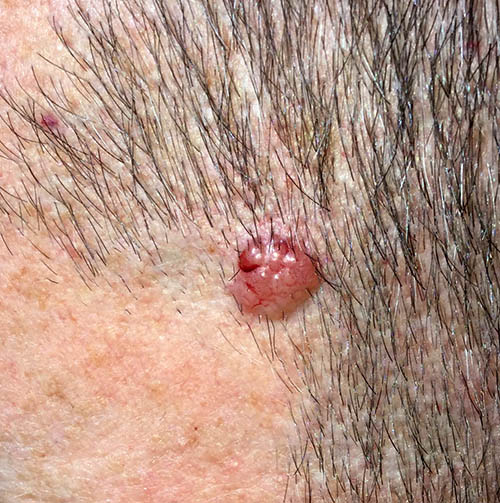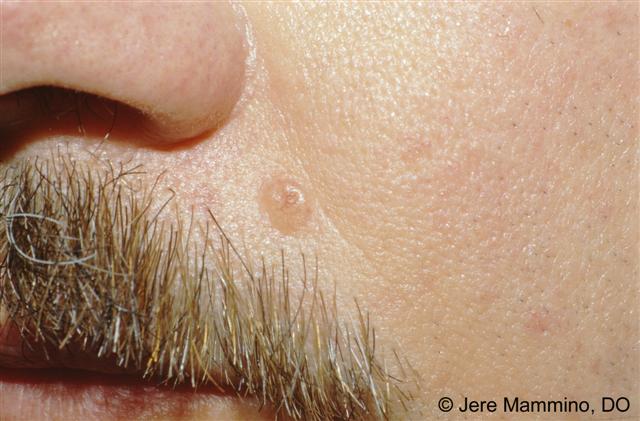Basal Cell Carcinoma

Basal cell carcinomas (BCC) are a type of skin cancer. They can develop on any part of the body. Those with fair skin are more likely to develop them, but people of any skin tone should be cautious in the sun. Women are at a higher risk than men, but both sexes should practice sun safety. Fortunately, there are many treatment options available for BCC, including surgical removal.
One of the most common forms of BCC is morpheaform. This type of skin cancer usually presents as a flesh-colored or white lesion, with areas of induration or borderline irregularity. It can resemble a morphea or scar. The surface of a morpheaform BCC is flat, scaly, and may be elevated. It is often asymptomatic.
A type of BCC that is characterized by a distinct pattern is the pigmented type. This form is most likely to present as a red or brown bump on the skin. It may also contain a translucent border. It is also known as superficial BCC, which usually manifests as a raised or flat patch of skin. In addition, it may be associated with an increase in risk for breast cancer. Among patients with this type of skin cancer, there are some risk factors that can help determine whether you’re at a higher risk of developing it.
While there are several other causes of basal cell carcinoma, the main cause is ultraviolet radiation. Exposure to UV radiation from sunlight has been identified as the primary cause of this type of cancer. Indoor tanning beds and skin creams are also responsible for BCC. The most common locations for this type of cancer are the face, neck, and arm. While skin cancer is the most common form, it can develop on almost any part of the body.
A BCC that develops on the face is called a pigmented BCC. It often looks like a flesh-colored bump with visible blood vessels. The most common locations for BCC are the neck, face, and ears. In some cases, it is a small, red or flesh-colored bump that is surrounded by a white border. In other cases, it may appear as a raised patch with a scaly edge.

Nonulcerative basal cell carcinoma (NUC) is a type of skin cancer that appears as a red or yellowish bump on the skin. It is typically translucent and has visible blood vessels. It is found most often on the face, neck, and ears. It can become disfiguring and can spread to nearby areas of the body. It can also lead to skin infections and other diseases. Hence, a diagnosis of a BCC is crucial to ensure a positive outcome.
A BCC is most commonly seen on body parts exposed to sunlight, such as the face, neck, and arms. It is usually a pigmented or flesh-colored mass that appears as a solid, flat, scaly patch. The disease is most likely to spread to the lungs and bone and can spread to the limbs and torso. Consequently, it is important to know the symptoms and risk factors of a basal cell carcinoma.
The morpheaform subtype of BCC is the most common form. It usually appears as a white or flesh-colored lesion. Its border is often ill-defined, and it can resemble a psoriasis or scar. It may be painful and may be life-threatening. Symptoms of BCC include inflammation, a white or flesh-colored patch on the skin with a red or brown edge.
In addition to being a cosmetic condition, BCC can affect the nerves and muscles in the body. It can spread to muscles and bones, causing a severe rash that can eventually lead to amputation. It can also spread to other parts of the body, and in some cases, melanoma can spread to other parts of the body. Symptoms of basal cell carcinoma can range from a scaly patch to a large menacing size. For more information about the symptoms and treatment of basal cell carcinoma, visit yomeapunto.com.mx.
This skin cancer usually starts as a small, flesh-colored nodule that looks like a papule. It may develop ulcers, and the edge may be covered with a crust. Usually on the cheeks, forehead, eyelids and nasolabial folds. This is common in dark-skinned people. Although common, a large number of people with basal cell carcinoma experience recurrence of the lesions.


